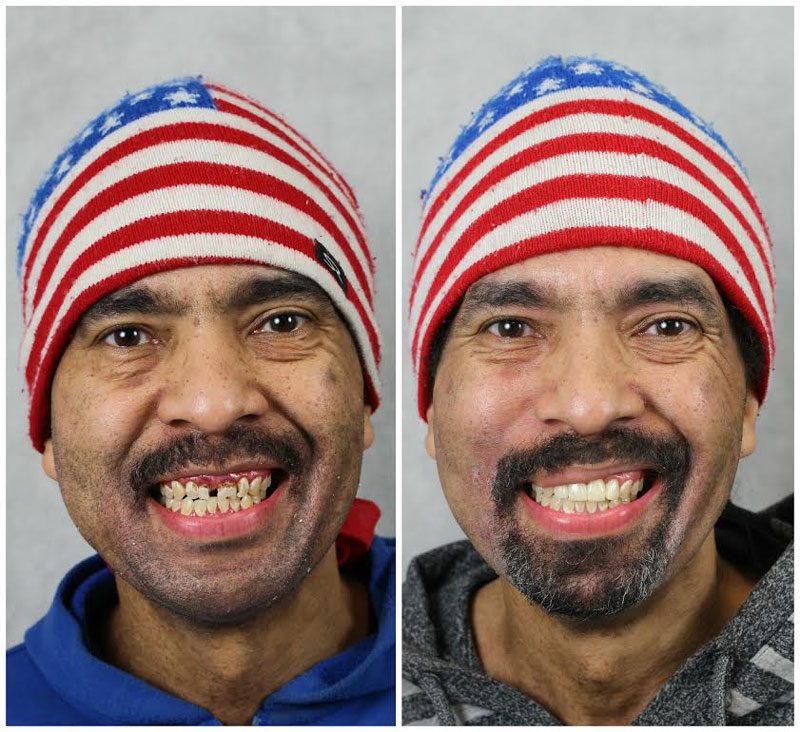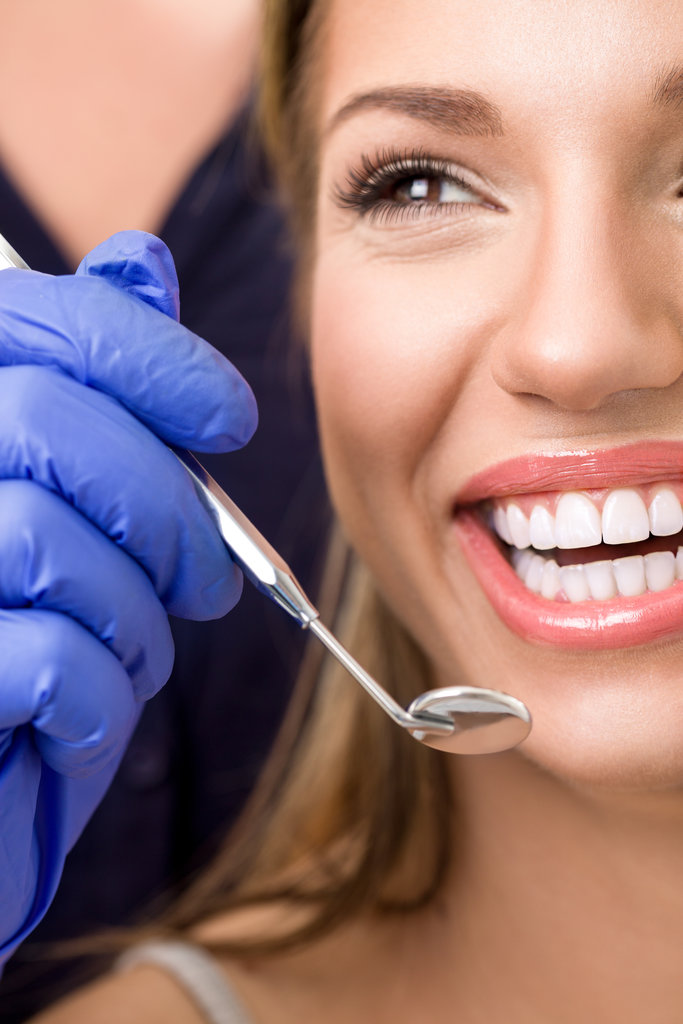Bonding is an economical cosmetic and restoration dental solution designed for budget-conscious patients who want to improve their smile. In addition to being one of the more affordable cosmetic dental treatments, it is also very conservative and noninvasive. The bonding process can be one of the more comfortable treatments in cosmetic dentistry.
Correct Imperfections with Cosmetic Dental Bonding
Patients seeking to enhance their smiles with small cosmetic changes may benefit from a simple yet effective cosmetic dental procedure known as dental bonding. This treatment is fast, noninvasive, and budget-friendly, and it can improve the appearance of front teeth, correct imperfections, and restore confidence in one’s smile. At Simpson Dental, our experienced dental professionals use high-quality composite resin to reshape, restore, and perfect natural teeth.
Transform Your Smile with Dental Bonding
Dental bonding can be used to correct a number of imperfections in your smile, such as:
- Cracked, broken, or chipped teeth
- Gaps and spaces between teeth
- Misshapen teeth
- Stained or darkened teeth
- Worn-down teeth

General and Family Dentistry Financing Available
Quality dental care for the entire family with flexible financing that makes comprehensive treatment accessible.

Cosmetic and Restoration Dental Solution for Budget-Conscious Patients
Bonding is an economical cosmetic and restoration dental solution designed for budget-conscious patients who want to improve their smile. In addition to being one of the more affordable cosmetic dental treatments, it is also very conservative and noninvasive. The bonding process can be one of the more comfortable treatments in cosmetic dentistry!
How the Dental Bonding Procedure Works
Dental bonding is a straightforward procedure that is often completed in one appointment. The tooth’s surface is gently roughened to help the bonding material adhere properly. A tooth-colored composite resin, carefully matched to your natural teeth, is then applied. Layer by layer, the material is sculpted to achieve the desired shape before being cured with a special light to ensure durability. Once hardened, the bonded tooth is polished for a seamless blend with surrounding teeth, leaving you with a naturally enhanced smile.
Comparing Bonding to Alternative Cosmetic Treatments
When considering smile enhancement options, patients often compare bonding to dental veneers and crowns. Bonding offers the advantage of being completely reversible, as minimal tooth preparation is required. Unlike veneers, which require removing a thin layer of enamel, bonding maintains your natural tooth structure.Teeth whitening addresses discoloration but cannot correct chips, gaps, or shape irregularities that bonding can fix. For patients with multiple cosmetic concerns, combining treatments often provides the most comprehensive results. Our team develops a treatment plan that maximizes both your budget and aesthetic goals.
Teeth whitening addresses discoloration but cannot correct chips, gaps, or shape irregularities that bonding can fix. For patients with multiple cosmetic concerns, combining treatments often provides the most comprehensive results. Our team develops a treatment plan that maximizes both your budget and aesthetic goals.
Advantages of Dental Bonding
One of the primary benefits of dental bonding is its quick and painless nature. Most procedures are completed in a single visit, often without the need for anesthesia unless treating tooth decay. It is also a more affordable option compared to crowns or veneers while preserving most of the natural tooth structure. Unlike other cosmetic dental procedures, bonding provides immediate results, allowing patients to walk out of their appointments with an improved smile.
Enhancing Your Smile with Teeth Whitening and Bonding
For patients looking to achieve a brighter smile, teeth whitening can be combined with dental bonding for optimal results. Since the composite resin color is matched to your natural teeth, it is recommended to undergo whitening before the bonding procedure to ensure a uniform, vibrant appearance. This cosmetic procedure is ideal for those looking to address both discoloration and minor imperfections in one treatment plan. A dental professional can help determine the best approach to achieving healthy teeth with a natural, polished look.
Caring for Your Bonded Teeth
With proper care, bonding material lasts for several years. Maintaining good oral hygiene practices, such as brushing twice a day with fluoride toothpaste and flossing daily, is essential for preventing tooth decay. Visiting your dentist regularly for checkups and professional cleanings ensures the longevity of your bonded tooth. To avoid chipping, it is best to refrain from chewing on hard substances like ice, hard candy, or fingernails. Limiting the intake of staining foods and drinks, including coffee, tea, and red wine, helps preserve the color of the composite resin over time. If you grind your teeth or participate in contact sports, wearing a mouthguard can help protect your bonded teeth from damage.
How Dental Bonding Affects Your Bite and Chewing
Because dental bonding adds material to the tooth, it can subtly alter your bite and chewing patterns. A properly executed bonding procedure ensures that your bite remains comfortable and functional. The dental professional carefully sculpts the composite resin to maintain a natural feel while chewing and speaking. It is important to monitor any changes in how your teeth align and to visit your dentist if you experience discomfort or notice any uneven surfaces that affect your bite.
Is Dental Bonding Right for You?
Dental bonding is an excellent option for those looking to improve their smile without extensive dental work. However, it may not be suitable for all cases. Patients with significant structural damage may require alternative restorative dentistry solutions such as crowns or veneers. If you’re considering dental bonding, our team at Simpson Dental can evaluate your needs and recommend the best treatment plan.
When Bonding May Not Be the Best Option
While bonding addresses many cosmetic concerns, certain situations require alternative treatments. Patients with extensive tooth damage, large cavities, or significant structural problems may benefit more from dental bridges and crowns or other restorative options. Heavy teeth grinders may experience frequent bonding repairs due to the material’s susceptibility to fracturing under excessive force.Dr. Mark Simpson, Dr. Christen Simpson Raynes, and Dr. Chase Preston evaluate each case individually to recommend the most appropriate treatment. This ensures you get the most effective and long-lasting answer for your needs.
Dr. Mark Simpson, Dr. Christen Simpson Raynes, and Dr. Chase Preston evaluate each case individually to recommend the most appropriate treatment. This ensures you get the most effective and long-lasting answer for your needs.
Advanced Bonding Techniques and Technology
Modern bonding techniques incorporate advanced adhesive systems and layering methods to achieve superior results. A multi-layer application allows for better color matching and increased strength. Each layer is carefully cured and shaped before applying the next, creating depth and translucency that mimics natural tooth enamel.
Digital shade matching technology ensures precise color selection, eliminating guesswork in matching your existing teeth. This is especially beneficial for patients with naturally varied tooth colors or previous dental work. Our advanced technology helps achieve consistent, predictable results that exceed traditional bonding methods.
Frequently Asked Question about Dental Bonding
How long does dental bonding typically last?
Dental bonding can last several years with proper care and maintenance. The longevity depends on factors such as oral hygiene habits, diet, and lifestyle choices. Regular dental checkups, avoiding hard foods that could chip the material, and limiting staining substances like coffee and wine help extend the life of bonded teeth. Most patients find bonding to be a durable solution for minor cosmetic corrections.
Can dental bonding be whitened if it becomes stained?
Unlike natural teeth, composite resin used in dental bonding cannot be whitened with traditional bleaching treatments. If your bonded tooth becomes discolored, the bonding material will need to be replaced to match your desired shade. This is why dentists often recommend completing any teeth whitening procedures before bonding, ensuring the composite resin is matched to your brightest natural tooth color for optimal results.
Is dental bonding painful and does it require anesthesia?
Dental bonding is generally a comfortable, painless procedure that typically doesn’t require anesthesia unless the bonding is being used to fill a cavity. The process involves minimal tooth preparation, preserving most of the natural tooth structure. Patients usually experience no discomfort during or after the procedure, making it an excellent option for those who are anxious about dental treatments or prefer conservative approaches.
How does dental bonding compare to veneers in terms of cost and durability?
Dental bonding is significantly more affordable than veneers and can be completed in a single visit, while veneers typically require multiple appointments and laboratory work. However, veneers generally last longer and resist staining better than bonding material. Bonding is ideal for minor corrections and budget-conscious patients, while veneers are better suited for more extensive cosmetic changes and patients seeking maximum durability and stain resistance.
Can dental bonding fix gaps between teeth effectively?
Yes, dental bonding is an excellent solution for closing small to moderate gaps between teeth. The composite resin is carefully applied and sculpted to extend the width of adjacent teeth, effectively eliminating the space. This approach is less invasive and more affordable than orthodontic treatment for minor spacing issues. However, larger gaps may require alternative treatments like orthodontics or veneers for optimal results and long-term stability.
Schedule Your Dental Bonding Consultation Today
At Simpson Dental, we’ve built a reputation as Charleston’s most trusted dental practice through generations of dedication to our patients. Since 1948, our family-led team has been committed to creating lasting relationships with those we serve, delivering care that goes beyond the chair. From the moment you walk into our office, you’ll experience the difference – a warm, welcoming environment, a compassionate team, and an unwavering focus on your comfort and well-being.
Our commitment to excellence and patient-centered care has made Simpson Dental a cornerstone of the Charleston community. We’ve proudly maintained a tradition of innovation and trust led by Dr. Mark Simpson and Dr. Christen Simpson Raynes.
Whether you’ve been with us for years or are joining our practice for the first time, we’re here to provide the personalized care you deserve.
Call Simpson Dental today at (304) 342-6162 or visit our contact form to schedule your appointment. Let us show why Charleston families choose us for their dental care.

Best Dentists in Charleston with Generational History
At Simpson Dental, we’ve built a reputation as Charleston’s most trusted dental practice through generations of dedication to our patients. Since 1948, our family-led team has been committed to creating lasting relationships with those we serve, delivering care that goes beyond the chair. From the moment you walk into our office, you’ll experience the difference – a warm, welcoming environment, a compassionate team, and an unwavering focus on your comfort and well-being.
Meet Your Charleston Dentists
When you choose Simpson Dental, you’re choosing a team with three generations of experience serving Charleston, WV. Our doctors combine advanced training with a genuine commitment to patient care.

Dr. Mark W. Simpson, DDS
Dr. Mark Simpson continues the family tradition his father, Dr. Bob, established in 1948. With decades of experience and a commitment to the highest quality care, Dr. Simpson has built a reputation for excellence throughout Charleston.

Dr. Christen Simpson Raynes, DDS, MBA
As a third-generation dentist and one of the Top 25 Women in Dentistry, Dr. Christen brings advanced expertise and modern techniques to the practice. She combines her grandfather's and father's legacy with cutting-edge technology.

Dr. Chase Preston, DDS
Dr. Preston joined our team to provide exceptional care while maintaining the personal, family-focused approach that sets Simpson Dental apart.
Hear From Our Patients
Don’t just take our word for it. See what patients throughout Charleston are saying about their experience with Simpson Dental.
Explore Our Complete Dental Services
Simpson Dental offers comprehensive dentistry for patients throughout Charleston, WV. From preventive care to advanced restorative procedures, our three-generation practice delivers exceptional results.
- General Dentistry
- Cleanings
- Gum Disease Treatment
- Tooth Extractions
- Dental Botox & Fillers
Visit Us!
Conveniently located in Charleston, West Virginia, Simpson Dental has been serving our community since 1948. Our state-of-the-art facility features the most advanced dental technology in the state, including an on-site dental lab for same-day solutions.
Our central Charleston location makes it easy for patients throughout the Kanawha Valley to access exceptional dental care. We serve patients from Cross Lanes, South Charleston, Dunbar, St. Albans, Beckley, Fayetteville, Lewisburg, and surrounding communities. We also welcome patients from the Huntington area and nearby Ashland, Kentucky, who travel to Charleston for our specialized services and same-day solutions.
